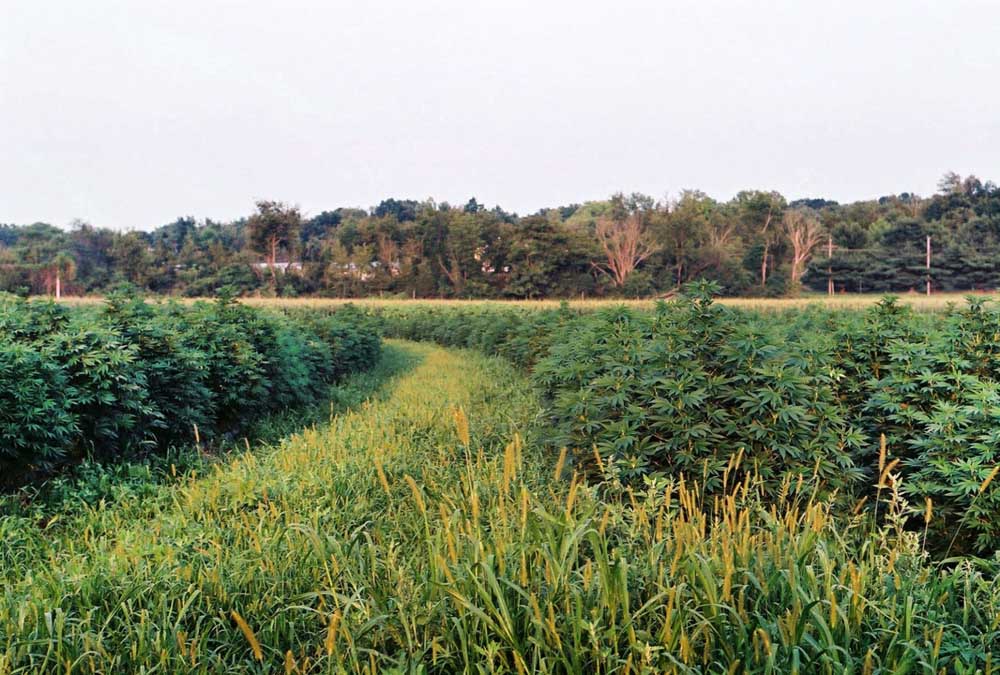The future of regenerative farming looks to hemp
Published 4:30 pm Friday, January 21, 2022

- A robust Hudson Hemp farm during the growing season. Photo courtesy of Hudson Hemp.
Forget the stereotypical images of macramé plant hangers and 1970s barefoot hippies. Hemp has come solidly into the 21st century with surprising range, versatility and renewed popularity.
One of the first companies licensed to grow industrial hemp in New York, Hudson Hemp got its start in 2017 shortly after hemp was legalized in the state.
Trending
“We decided to go in this direction as hemp is a particularly specialized plant in carbon sequestering, which ties into our regenerative agricultural practices,” says Hudson Hemp co-founder Melany Dobson, of the decision to go into the hemp business.
“This year, we produced 10 acres of CBD-rich hemp to use in tinctures and salves currently featured on our website. We also partner with external companies to create products for their businesses.”
Hemp in regenerative farming
Not only does regenerative farming work to reverse the effects of chemical pollution and decarbonization to improve topsoil health and fertility, it also helps reduce soil erosion and loss that can contribute to climate change.
Together with her sister, Freya, and brother, Ben, Dobson and the Hudson Hemp farm team focus on enriching and leaving the soil of their Old Mud Creek Farm and Stone House Farm properties better off than they found it. Born into a family that raised lettuce and tomatoes, Dobson only decided to follow in her father’s organic farming footsteps after a stint in Northern California opened her eyes to the possibilities the cannabis industry had to offer.
“Regenerative farming aims to not only maintain the integrity of the environment, but enhance it with strategic crop rotation and nutrient sequestering,” she explains. “Organic farming may meet certain guidelines and regulations to achieve certification, but doesn’t follow the same format of ecosystem balancing that allows for longevity in sustainable harvesting.”
As adopters of the regenerative practice movement, the Dobsons’ transition began back in 2013 with a move toward diversifying and earning organic, non-GMO status for their farming operations. Hemp has helped them achieve these goals by producing a viable crop that supports biodiversity, sustainability and carbon sequestration — the ability to pull carbon dioxide out of the air and reintroduce it into the soil — through a natural, closed-loop farming system.
All about hemp
Trending
Although it’s receiving renewed attention in recent years, hemp has actually been around for millennia with historical mentions going back as far as 8000 B.C.
“Hemp (cannabis sativa) is a type of plant that contains medicinal properties,” Dobson describes. “Hemp and cannabis are both the same species of plant, only differing in THC content. Cannabis contains higher than 0.3 percent THC content, whereas hemp contains less than said amount.”
Cannabis was widely grown in the United States until the Marijuana Tax Act of 1937 put the kibosh on the crop until 2018, when the U.S. Farm Bill federally legalized hemp production, ushering in a new generation of CBD growers and suppliers. The versatility of the crop is part of what makes hemp so appealing.
“CBD has been known to help treat anxiety, minor aches and pains,” Dobson notes. “Hemp also provides strong, fibrous material that can be used in the production of food, fuel and fiber.”
Hand-in-hand with Hudson Hemp growing operations, Dobson and her sister oversee the production and sales of Treaty, their line of plant extract-enhanced CBD tinctures in four formulas: Calm, Focus, Recover and Balance.
The complete ABCs of hemp, CBD and THC
Hemp and marijuana: The same?
Many people mistakenly believe that hemp and marijuana are the same. Not the case, Dobson explains.
“It has raised concerns of whether hemp can make someone high,” she continues. “This is untrue, as hemp and marijuana contain different chemical properties.”
It’s important to read CBD product labels closely because the regulation of CBD products currently varies by state, which can lead to discrepancies in quality and potency. Hudson Hemp insists on careful in-house analysis and third-party testing to assure high product integrity and standards.
The future of hemp farming
As the CBD industry continues to expand, industrial hemp presents an intriguing proposition for farmers wanting to diversify their crops and venture into new markets. Dobson hopes to continue blazing new trails for others to follow into the world of hemp and regenerative farming.
“Now that cannabis has been legalized in multiple states, as well as being in the works for New York, this will provide new opportunities for hemp growers to produce both hemp and cannabis if they so choose,” she says.



